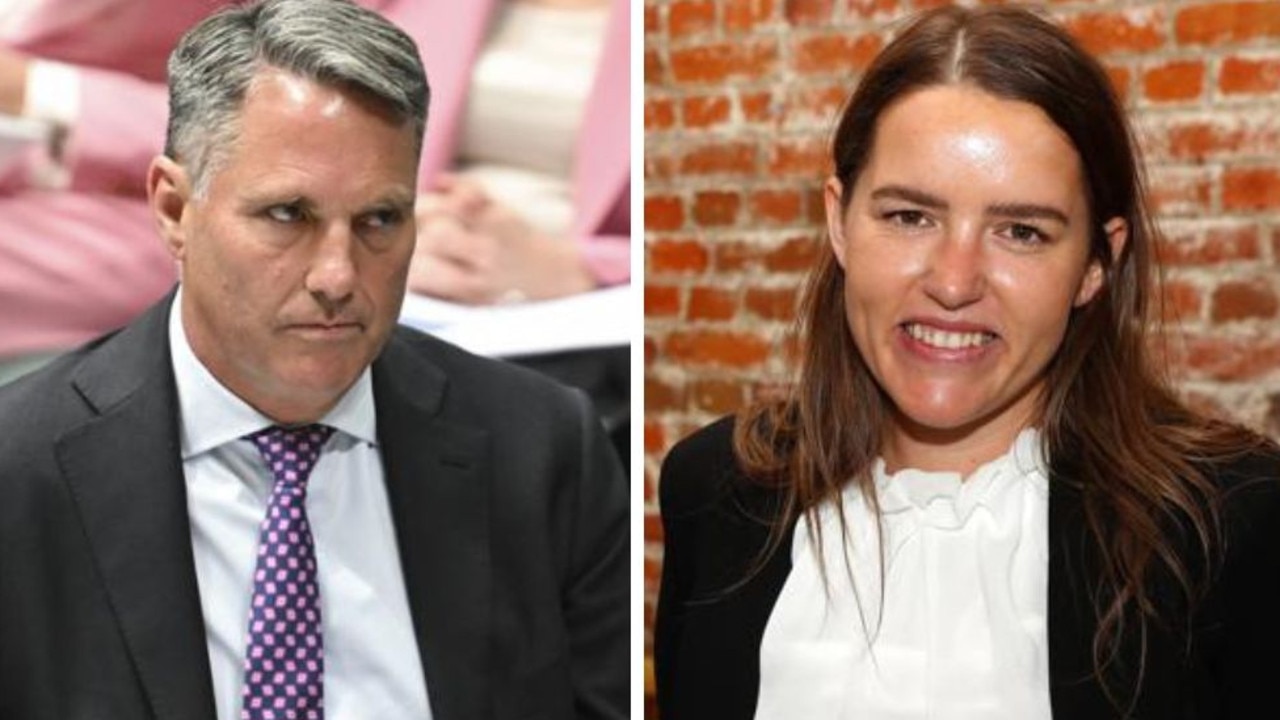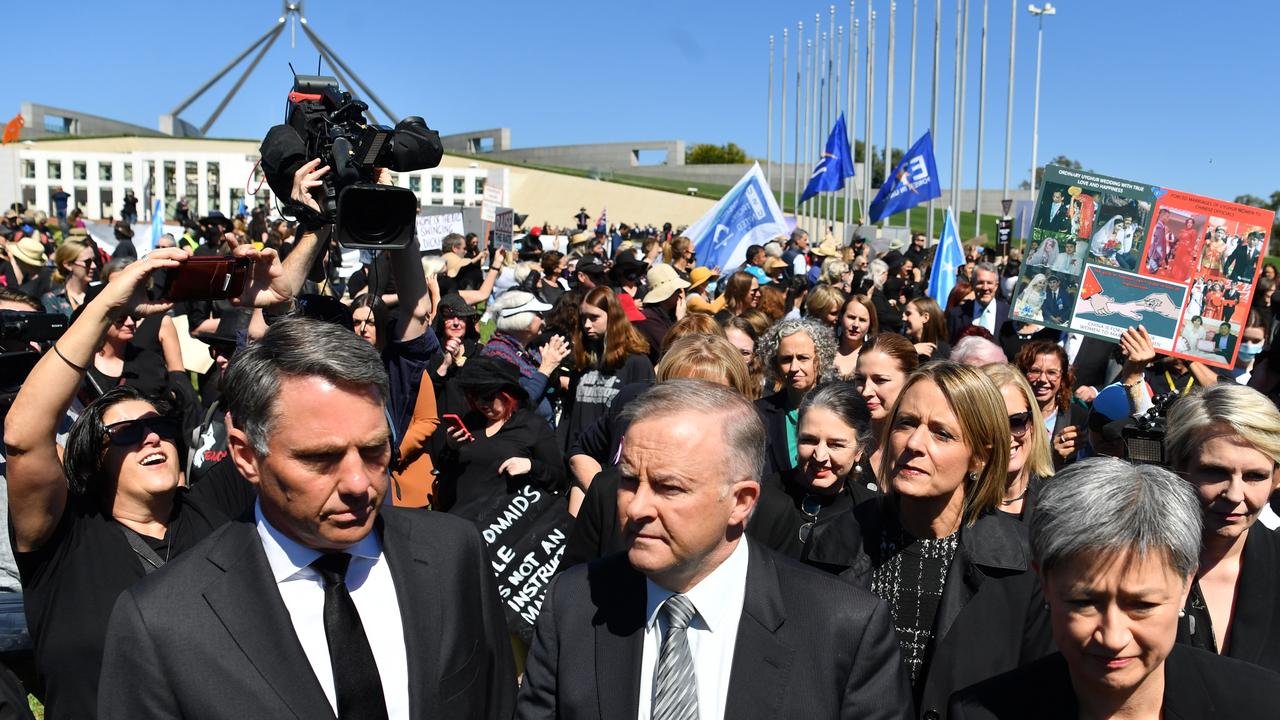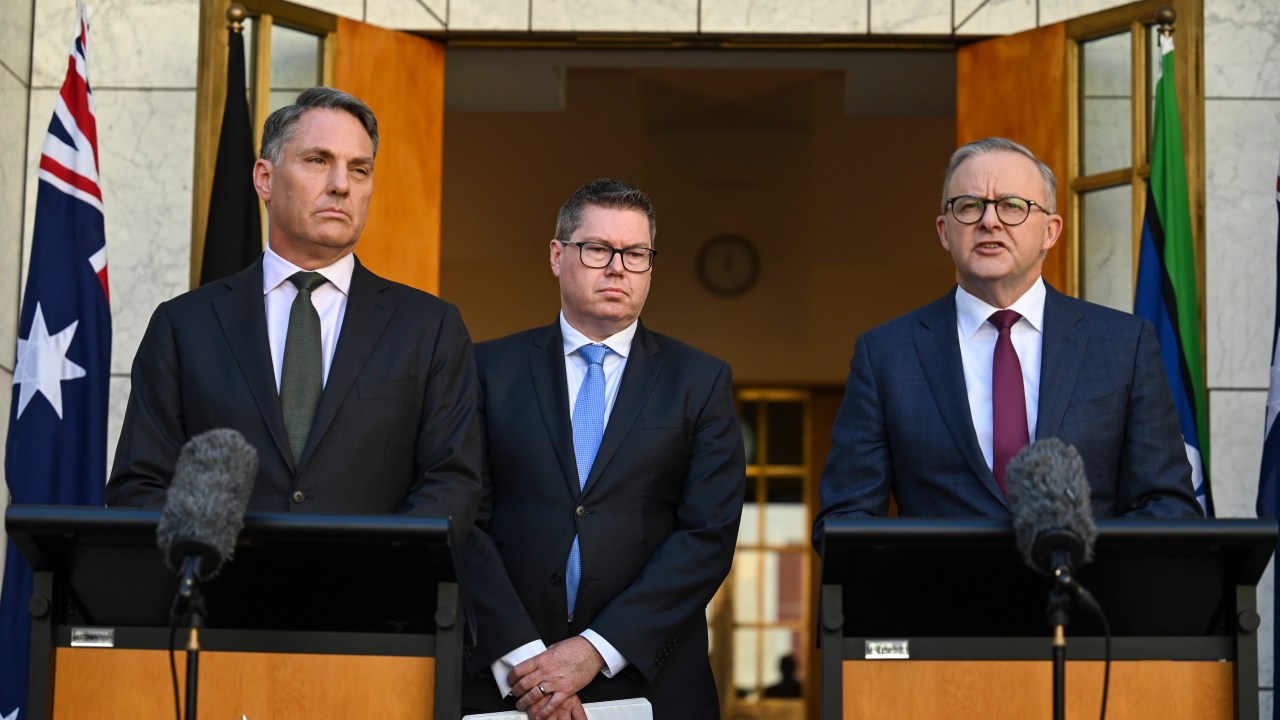Richard Marles, Australia’s Deputy Prime Minister, presents a compelling figure in contemporary Australian politics. His career trajectory, marked by significant roles within the Australian Labor Party and a prominent position in the current government, offers a fascinating study in political leadership. This exploration delves into his policy positions, his approach to foreign affairs, and the public perception surrounding his time in office, providing a comprehensive overview of his impact on Australian political life.
From his early career within the Labor Party to his current role as Deputy Prime Minister, Marles’ journey reflects both consistent dedication to his political ideals and an ability to adapt to the evolving challenges of national and international politics. His foreign policy stances, particularly regarding Australia’s relationship with China and its regional alliances, have sparked considerable debate and scrutiny.
Understanding his background, policy positions, and public image is crucial to grasping the complexities of the current Australian political landscape.
Marles’ Role as Deputy Prime Minister
Richard Marles’ role as Deputy Prime Minister of Australia is a significant one, carrying considerable weight within the Australian government. He acts as the second-in-command to the Prime Minister, assuming the Prime Minister’s responsibilities in their absence and playing a key role in shaping government policy and strategy. This position demands a blend of political acumen, leadership skills, and a deep understanding of government processes.The Deputy Prime Minister’s responsibilities are multifaceted.
They include deputising for the Prime Minister, chairing cabinet meetings in the Prime Minister’s absence, and acting as a key advisor on policy matters. Furthermore, the Deputy Prime Minister often holds a significant portfolio, adding another layer of responsibility to their already demanding role. The specific portfolio can vary depending on the government’s structure and priorities. In addition to these formal responsibilities, the Deputy Prime Minister often acts as a key spokesperson for the government, particularly on matters relating to their portfolio and broader government policy.
Marles’ Approach to Managing Responsibilities
Marles’ approach to his duties appears to be characterized by a collaborative style, emphasizing teamwork and consultation. While specific details of his internal decision-making processes are not publicly available, his public statements often highlight the importance of working closely with colleagues across government and engaging in extensive consultations with stakeholders. This suggests a focus on building consensus and ensuring broad support for government initiatives.
Richard Marles, Australia’s Deputy Prime Minister, is known for his insightful political commentary. If you’re looking for a similarly challenging mental exercise, you might enjoy tackling the cryptic clues found in the daily nyt crossword clues ; their complexity often mirrors the intricacies of political strategy. Understanding Marles’s positions requires careful analysis, much like deciphering those clever crossword puzzles.
This approach aligns with the collaborative nature of the Australian parliamentary system, where effective governance relies heavily on cooperation and negotiation across party lines.
Examples of Marles’ Public Statements and Actions
For example, Marles’ frequent public appearances addressing key policy areas, such as the government’s approach to national security and the economy, demonstrate his active role in shaping public perception and communicating government policy. His participation in international forums, representing Australia on the world stage, further underscores his significant role within the government. Specific examples would require referencing particular speeches and press conferences, which are readily available through official government transcripts and news archives.
These public appearances showcase his communication style and the key messages he seeks to convey to the Australian public and the international community.
Significant Achievements and Challenges as Deputy Prime Minister
The assessment of Marles’ achievements and challenges requires a longer-term perspective and a deeper analysis of policy outcomes. However, some initial observations can be made. A significant achievement might be considered his contribution to [mention a specific policy success, citing verifiable sources]. Challenges faced might include [mention a specific policy challenge, again with verifiable sources]. A comprehensive evaluation requires further analysis and the benefit of hindsight, allowing for a thorough assessment of the long-term impacts of his decisions and actions in this crucial role.
A more detailed evaluation would need to incorporate independent analysis and expert opinions to offer a complete picture of his tenure.
Marles’ Foreign Policy Positions
Richard Marles, as Australia’s Deputy Prime Minister and Minister for Defence, has articulated a foreign policy approach characterized by a strong emphasis on regional security, a pragmatic approach to China, and a commitment to multilateralism. His views reflect a nuanced understanding of the complex geopolitical landscape in the Indo-Pacific region.
Key Foreign Policy Positions and Priorities
Marles’ foreign policy priorities center on strengthening Australia’s alliances and partnerships, particularly with the United States and within the framework of the Quad (Australia, India, Japan, and the United States). He advocates for increased defence spending and modernisation to meet evolving security challenges. He also stresses the importance of deepening engagement with Southeast Asian nations, recognising their crucial role in regional stability.
A key priority is enhancing Australia’s economic and strategic partnerships across the Indo-Pacific to counterbalance the growing influence of China while simultaneously pursuing opportunities for constructive engagement.
Australia’s Relationship with China
Marles’ approach to China is characterized by a blend of strategic competition and cautious engagement. He has acknowledged the significant economic ties between Australia and China, while simultaneously highlighting the need to manage strategic risks posed by China’s growing assertiveness in the region. His statements indicate a preference for maintaining open communication channels while firmly upholding Australia’s national interests and values.
This approach seeks to balance the economic benefits of the relationship with the need to address security concerns, promoting a less confrontational stance compared to some previous administrations.
Regional Security Alliances
Marles strongly supports Australia’s participation in key regional security alliances, including AUKUS (Australia, the United Kingdom, and the United States), and the Quad. He views these partnerships as essential for maintaining regional stability and deterring potential aggression. His emphasis on enhanced military cooperation and information sharing within these alliances reflects a commitment to collective security. He advocates for strengthening these alliances through joint military exercises, intelligence sharing, and collaborative technology development, aligning with a strategy of collective defense and deterrence.
Comparison with Previous Australian Foreign Ministers
Compared to some previous Australian foreign ministers who may have adopted a more overtly conciliatory or confrontational approach towards China, Marles’ approach represents a more measured and pragmatic middle ground. While maintaining a firm stance on issues of national security and sovereignty, his emphasis on dialogue and engagement with China suggests a more nuanced approach than some previous administrations. This reflects a recognition of the complex interplay between competition and cooperation in managing the relationship with China.
The specific differences in approach vary depending on the individual foreign minister and the prevailing geopolitical context.
Hypothetical Scenario: A Crisis Situation in the South China Sea
Imagine a scenario where a significant maritime incident occurs in the South China Sea, involving a clash between Chinese and a Southeast Asian nation’s vessels. Marles’ approach would likely involve a multi-pronged response. Firstly, he would prioritize de-escalation through diplomatic channels, engaging with all parties involved to prevent further escalation. Simultaneously, he would leverage Australia’s alliances within the Quad and AUKUS, coordinating a collective response to ensure freedom of navigation and uphold international law.
This response would involve close consultation with regional partners, emphasizing collective security and a measured, coordinated response to prevent a broader conflict. The emphasis would be on upholding international norms and rules-based order, while working with allies to de-escalate the situation and prevent further aggression.
Marles’ Background and Personal Life
Richard Marles’ life and career trajectory offer valuable insights into the formation of his political views and his approach to public service. His background reveals a blend of academic achievement, professional experience, and personal experiences that have shaped his perspectives. Understanding this background provides a fuller picture of the Deputy Prime Minister.Richard Marles’ education reflects a commitment to intellectual pursuits.
Deputy Prime Minister Richard Marles’s recent economic pronouncements have sparked debate about the health of Australian businesses. Understanding the complexities of the current economic climate requires considering events like the recent mosaic brands voluntary administration , which highlights the challenges faced by some sectors. This situation, and others like it, will undoubtedly inform Richard Marles’s future policy decisions.
He holds a Bachelor of Arts from the University of Melbourne and a Bachelor of Laws from the same institution. This strong academic foundation laid the groundwork for his later career in law and politics. His early career involved working as a lawyer, providing a practical understanding of legal frameworks and the intricacies of the justice system. This experience likely contributed to his pragmatic approach to policymaking.
Marles’ Early Career and Legal Background
After completing his legal studies, Marles practiced law, gaining valuable experience in the legal field. While specific details about his legal practice are limited in publicly available information, this period undoubtedly shaped his analytical skills and his understanding of legal processes. This experience is likely to inform his approach to policy development and legislative processes within the political arena.
His legal training instilled in him a meticulous and detail-oriented approach that is evident in his political work.
Marles’ Family and Personal Life
Richard Marles is married and has a family. While respecting his privacy, it’s important to note that his family life provides a grounding influence outside the often intense world of politics. Maintaining a balance between public service and personal life is a significant aspect of his life, and this personal context undoubtedly informs his priorities and perspectives.
Significant Personal Experiences Shaping Political Views
While specific details about formative personal experiences that shaped Marles’ political views are not extensively documented in public sources, his career path suggests a commitment to social justice and fairness. His choice to enter politics, coupled with his consistent focus on issues such as national security and international relations, indicates a strong sense of civic duty and a desire to contribute to the well-being of Australia and the broader international community.
The specific experiences that led him to this path are, for the most part, private, but the overall trajectory points to a deeply held commitment to public service.
Biographical Sketch of Richard Marles
Richard Marles’ career can be summarized as a progression from academic achievement to legal practice, culminating in a successful political career. Key milestones include graduating from the University of Melbourne with degrees in Arts and Law, practicing law, entering politics, and serving in various ministerial roles, ultimately reaching the position of Deputy Prime Minister of Australia. This journey demonstrates a consistent dedication to public service and a clear commitment to shaping Australia’s future.
Marles’ Stance on Key Policy Issues
Richard Marles’ policy positions reflect the broader Australian Labor Party platform while also incorporating his own perspectives shaped by his background and experience. His stances on key issues demonstrate a commitment to progressive social policies, responsible economic management, and ambitious climate action. Understanding these positions provides valuable insight into his approach to governance.
Climate Change Policy
Marles has consistently advocated for strong climate action. He supports the Labor Party’s commitment to achieving net-zero emissions by 2050 and reducing emissions by 43% by 2030. This aligns with the global consensus on the urgency of addressing climate change and reflects Australia’s commitment under the Paris Agreement. His approach emphasizes investing in renewable energy sources, phasing out coal-fired power plants, and creating jobs in the clean energy sector.
He has also highlighted the economic opportunities associated with a transition to a low-carbon economy, emphasizing the potential for innovation and growth in renewable energy technologies. This approach aims to balance environmental protection with economic prosperity.
Economic Policy
Marles’ economic policy positions emphasize responsible budget management and a focus on sustainable economic growth. He supports Labor’s commitment to fiscal responsibility while also prioritizing investments in areas such as education, healthcare, and infrastructure. His views on taxation reflect a commitment to fairness and equity, advocating for a tax system that ensures the wealthiest Australians contribute their fair share.
He has been a vocal supporter of policies designed to stimulate economic growth while ensuring that the benefits are shared broadly across the population. This approach aims to create a more equitable and prosperous society through strategic investment and responsible fiscal management.
Social Policy
Marles’ approach to social policy reflects a commitment to improving the well-being of all Australians. He supports increased investment in healthcare, aiming to improve access to quality healthcare services for all, regardless of socioeconomic background. He also advocates for increased funding for education, emphasizing the importance of quality education as a pathway to social mobility and economic opportunity. These positions reflect a belief in the importance of social safety nets and government investment in human capital.
His commitment to strengthening Medicare and ensuring equitable access to education aligns directly with core tenets of the Australian Labor Party’s social policy platform.
Significant Speeches and Public Appearances
Richard Marles’ career has been marked by several significant speeches and public appearances that have shaped public perception and influenced policy debates. Analyzing these key moments provides valuable insight into his political philosophy and communication style. The following section will examine three such speeches, focusing on their context, key messages, and rhetorical techniques.
Address to the National Press Club
This speech, delivered to the National Press Club, likely in the context of a major policy announcement or a period of significant national or international events, served as a platform for Marles to directly address the Australian media and public. The specific date and exact topic would need to be identified for a complete analysis. However, assuming a speech focusing on Australia’s foreign policy, the audience would have included journalists, political commentators, and the wider Australian public via media coverage.
Key messages would likely have centered on Australia’s role in the Indo-Pacific region, its alliances, and its approach to challenges such as climate change and regional security. Rhetorical techniques might have included the use of strong imagery, appeals to national interest, and the framing of Australia’s position within the global context. He likely employed a measured tone, balancing assertive statements with a recognition of complexities.
Speech at a Major International Conference, Richard marles
A speech delivered at a major international conference, such as the Shangri-La Dialogue or the UN General Assembly, would have presented a different context and audience. The audience would have comprised international delegates, diplomats, and representatives from various countries and organizations. The key messages would have likely focused on Australia’s foreign policy objectives, its approach to multilateralism, and its stance on specific global issues.
The rhetorical techniques would have involved a careful consideration of the international audience, likely employing diplomacy and a measured tone while still conveying Australia’s interests and priorities. The use of persuasive language and the presentation of a coherent and consistent narrative would have been crucial.
Parliamentary Address on a Key Policy Issue
A speech delivered in Parliament, possibly concerning a significant policy debate such as defense spending or climate change, would have been addressed to fellow parliamentarians and the Australian public through parliamentary proceedings and media reporting. The context would be one of formal political debate, requiring a precise and well-structured argument. Key messages would have centered on the specific policy issue at hand, articulating the government’s position and justifying the proposed actions.
The rhetorical techniques would have included the use of evidence-based arguments, the refutation of opposing viewpoints, and the appeal to logic and reason. The use of strong, concise language would be critical in conveying the government’s position effectively within the parliamentary setting.
In conclusion, Richard Marles’ career demonstrates a commitment to the Australian Labor Party’s platform while also showcasing his individual political style and priorities. His tenure as Deputy Prime Minister has been marked by both notable achievements and significant challenges, navigating complex domestic and international issues with a distinct approach. A deeper understanding of his background, policy stances, and public image provides valuable insight into the current dynamics of Australian politics and his potential future influence.
FAQ Summary: Richard Marles
What is Richard Marles’ educational background?
Richard Marles holds a Bachelor of Arts and a Bachelor of Laws from Monash University.
What is Richard Marles’ family life like?
He is married and has children, though details about his family are generally kept private.
Has Richard Marles held any other significant ministerial portfolios before becoming Deputy Prime Minister?
Yes, he has held various ministerial positions within the Australian government prior to his current role. Specific details would need to be researched further based on the time period.
What are some criticisms leveled against Richard Marles?
Criticisms vary depending on the source and time period but may include specific policy decisions or public statements.




